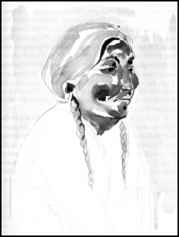Conclusion
The Observing Snow Curriculum is designed as a culturally
responsive program for rural middle school students. Core academic
subjects including science, math, and language arts are taught
using materials that are appropriate and make sense to native
students. By reaching out to the community and involving Elders
in the classroom, the Observing Snow curriculum has
the potential to help develop a rapport between the schools
and native communities, a relationship that has historically
been less than ideal. Inviting Elders into the school nourishes
the bridge between the young generation and their Elders, and
helps perpetuate the transmission of native culture and skills
to our children and the community.
When inviting Elders into the classroom, it is very important
to let them take the lead and choose what they would like to
do with the students. Very few Elders are comfortable lecturing
in front of the classroom in the traditional western academic
style. Many of our Elder activities occurred outside, where
we have learned winter skills such as building snares, starting
fires, making tea, building shelters and collecting drinking
water.
The native culture will typically not address a topic such
as snow in the discrete western fashion; instead a wealth of
information and skills are melded into Elder's stories and
activities. The schoolteacher exposes the students to the standard
western academics. Math, science, and language arts are presented
through a variety of fun and innovative activities. It is the
task of the students to draw connections and conclusions as
to how these two ways of understanding complement each other.
This type of learning rings true with the personal experience
of many of these Native children who are constantly trying
to incorporate the high tech 21st century world and the ancient
native ways of knowing.

Holy Cross Woman
by Claire Fejes from Villagers
This is a program that cannot operate in isolation. Its success
depends upon the cooperation of the school, the students, and
the community, especially the Elders. One of the toughest constraints
to overcome when developing this program was to come as a guest
to a small rural village and in a very short time try to rally
the community to participate in the Observing Snow program.
Now that the preliminary work has been done, the Denali Foundation
would like to see the program turned over to local residents
so that they may use it as a tool to develop a program in their
own villages. Because community involvement is so crucial,
it is highly recommended that a long time resident coordinate
the local programs. The Denali Foundation will offer resources,
materials and staff training if needed.
We chose the topic of snow to teach academic skills and encourage
Elder participation, but this curriculum can easily be used
as a model to do similar exercises with another topic of choice.
The most important theme is to approach the learning in a manner
that is receptive to the Native child's experience and environment.
There has been a resurgence of interest in trying to preserve
what is known of the native culture and languages while those
most knowledgeable are still with us. Observing Snow challenges
students to seek out their grandparents and community elders
and make connections with them. This program encourages communication
between generations and respect for Elders. Teaching children
to respect the knowledge of their Elders and helping schools
view the local culture as a resource are universal lessons
that transcend the cultures.
It was an honor and a privilege to be a guest at the villages
as we were developing the Observing Snow curriculum.
Many kind people opened their homes, school, hearts and minds
to us so that we could try in the field ideas that were designed
to stimulate middle school native students academically, and
to encourage collaboration not only between generations, but
between school and community as well. Now that this work is
done, we offer it as gift back to those communities, especially
Minto, McGrath, and Galena, that trusted us enough to let us
come into their close knit communities and work with their
children, Elders and schools. The work was extremely challenging,
but every time a student was successful with an activity, every
time an Elder shared, every time a connection was made between
native and western traditions, it was obvious that we were
on the right track. The Observing Snow curriculum is
only a starting point. By encouraging the collaboration of
traditional native knowledge and western academics, we can
give our children a strong foundation to become successful
academically and also to understand their place in the rapidly
changing modern world.
Activity: Making Connections
- List the main points learned in the snow science
exercises.
- Identify the key ideas learned from working
with Elders.
- Make connections between those two ways of
knowing.
|

Circle City
by Claire Fejes from Villager